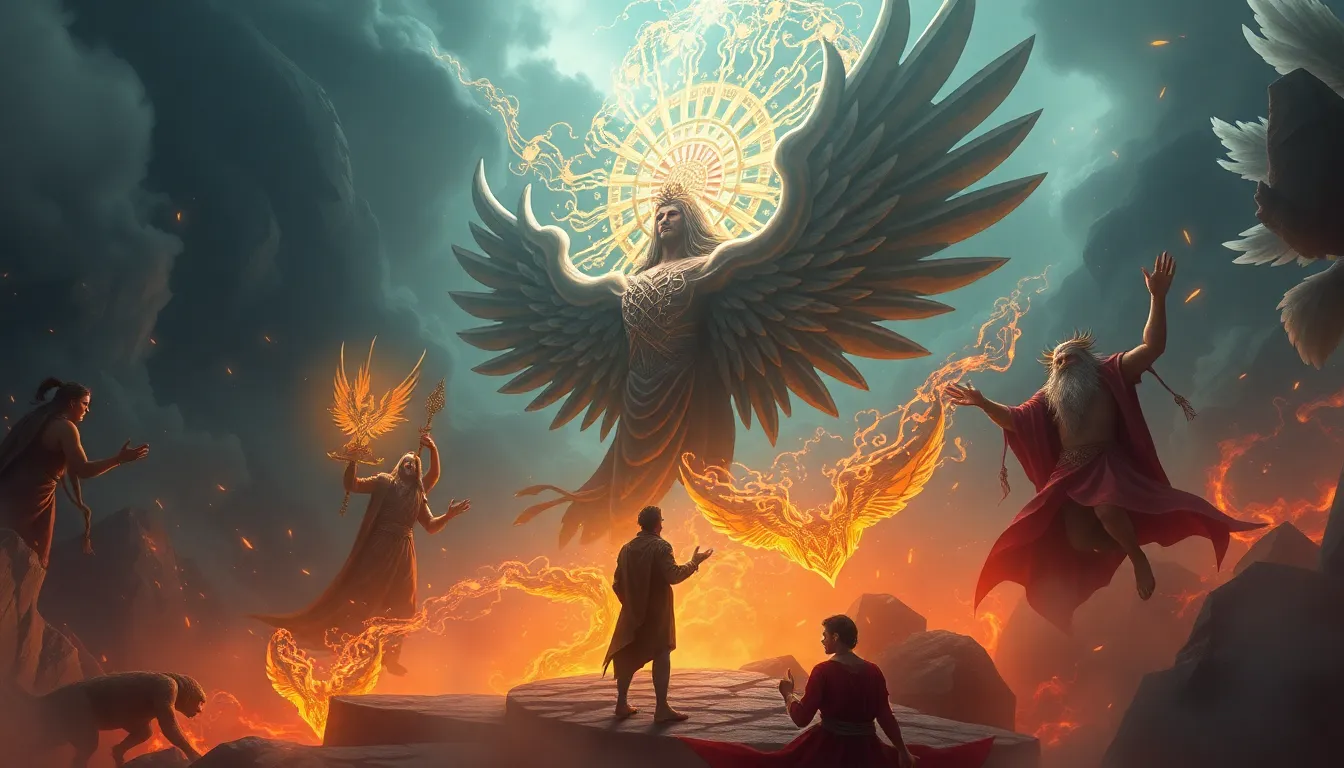Divine Trials: When Gods Play Games with Human Lives
I. Introduction: The Intersection of Divine Will and Human Fate
The concept of divine trials has captivated human imagination across various cultures and epochs. From ancient mythologies to contemporary literature, the idea that gods intervene in human lives, often through tests or trials, raises significant questions about fate, free will, and the nature of existence. This article focuses on the portrayal of gods as manipulators of human destinies, examining their role as both benefactors and tormentors in the lives of mortals.
Understanding divine trials is crucial not only in a cultural context but also in a philosophical sense, as these narratives reflect humanity’s struggle with the unknown and the often arbitrary nature of existence.
II. Historical Context: Gods and Mortals in Ancient Civilizations
Throughout history, ancient civilizations have crafted rich mythologies that depict the interactions between gods and mortals. For instance, in Greek mythology, deities like Zeus and Athena frequently intervene in human affairs, directing the fates of heroes and ordinary people alike.
Examples of notable myths include:
- Prometheus: Punished by Zeus for giving fire to humanity, symbolizing the tension between divine authority and human aspiration.
- Job: In the Hebrew Bible, Job’s suffering is a test of faith, questioning the nature of righteousness and divine justice.
These narratives often explore complex themes of fate and free will, revealing how mortals navigate the whims of powerful beings while grappling with their own desires and choices.
III. The Nature of Divine Trials: What Do They Entail?
Divine trials can be defined as challenges or tests imposed by gods on humans, often designed to assess their character, faith, or moral integrity. Characteristics of these trials include:
- Tests of Faith: Situations where characters must prove their devotion or belief in a higher power.
- Moral Dilemmas: Scenarios forcing individuals to choose between conflicting ethical principles.
- Existential Challenges: Trials that confront characters with the fundamental questions of existence and their purpose.
The psychological and emotional impacts of facing these trials can be profound, leading to growth, despair, or transformation. Individuals might experience:
- Resilience: Emerging stronger and more determined.
- Doubt: Questioning their beliefs and the fairness of their circumstances.
- Despair: Feeling overwhelmed by the challenges posed by divine forces.
IV. Case Studies: Modern Interpretations of Divine Trials
Contemporary literature and film continue to explore the theme of divine trials, reflecting its enduring relevance. Works such as “The Hunger Games” and “American Gods” present modern interpretations of these ancient concepts.
In “The Hunger Games”, characters face brutal trials orchestrated by a totalitarian regime, paralleling the capriciousness of ancient gods. Similarly, “American Gods” delves into the idea of deities competing for relevance in a secular world, highlighting the ongoing struggle between faith and skepticism.
Comparing ancient and modern interpretations reveals:
- Similarities in the portrayal of trials as mechanisms for growth.
- Divergences in the understanding of divine intent, with modern narratives often emphasizing personal agency.
The relevance of these narratives today lies in their reflection of societal challenges, prompting audiences to question their own beliefs and the forces that shape their lives.
V. The Purpose Behind Divine Trials: Divine Justice or Capriciousness?
The philosophical debate surrounding the purpose of divine trials raises critical questions: Are these challenges a form of divine justice or merely entertainment for the gods? Perspectives vary widely across cultures and religions:
- Christianity: Trials can be seen as a means of spiritual growth and divine testing of faith.
- Hinduism: Suffering is often viewed as a result of karma, with trials serving to teach lessons for future lives.
- Ancient Greek beliefs: Trials often reflect the gods’ whims, indicating a more capricious nature.
Many philosophers argue that divine testing fosters personal growth, challenging individuals to develop resilience, wisdom, and empathy through their experiences.
VI. Human Responses to Divine Trials: Resilience and Rebellion
Human responses to divine trials range widely, from unwavering faith to outright rebellion. Key responses include:
- Faith: Individuals who find solace in their beliefs during challenging times.
- Doubt: The questioning of one’s faith and the intentions behind divine trials.
- Rebellion: Characters who resist or challenge the divine forces at play.
Notable figures in mythology who have either embraced or resisted their trials include:
- Sisyphus: His eternal struggle against fate symbolizes the human spirit’s resilience.
- Job: His questioning of suffering exemplifies the struggle between faith and doubt.
These responses reflect the psychological implications of facing divine trials, shaping individual behavior and societal norms.
VII. Ethical Considerations: The Morality of Divine Manipulation
The ethical implications of gods testing mortals raise significant concerns regarding morality and justice. Key points of discussion include:
- Manipulation vs. Growth: Is it ethical for divine beings to manipulate human lives for the sake of tests?
- Impact on Morality: How do divine trials shape societal concepts of right and wrong?
Narrative morality plays a crucial role in shaping cultural values, influencing how societies perceive justice, suffering, and redemption.
VIII. Cultural Variations: How Different Cultures Interpret Divine Trials
Across different cultures, the interpretations of divine trials vary significantly, reflecting unique societal values and beliefs. For instance:
- In Eastern philosophies: Trials are often seen as karmic lessons, integral to the cycle of life and rebirth.
- In Indigenous cultures: Trials may be perceived as rites of passage, essential for personal and communal identity.
- In Western narratives: Trials are frequently depicted as tests of faith or character, often leading to redemption or downfall.
These cultural variations highlight how the concept of divine trials resonates with universal human experiences while simultaneously reflecting the distinct values of each society.



